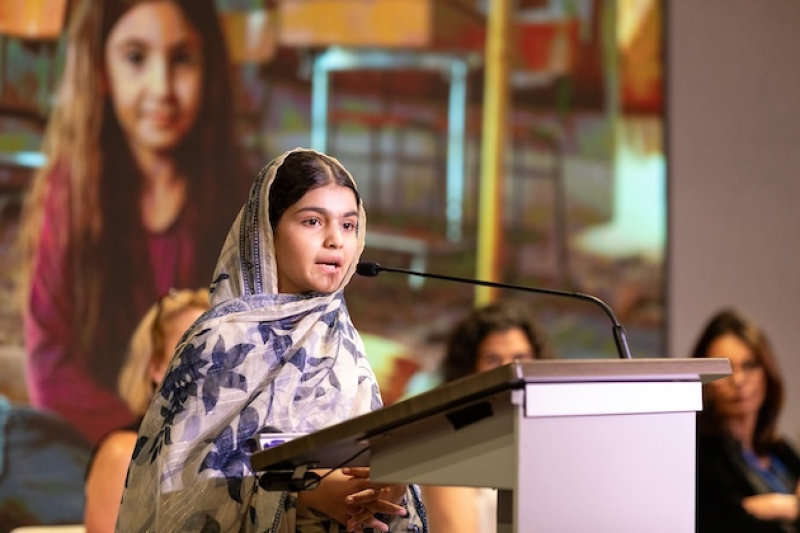- Prof Yunus Calls for People-Centered Democracy in Bangladesh |
- Record 676 Million Women Exposed to Deadly Conflicts |
- UN Renews Push for Global Elimination of Nuclear Arms |
- Don't leave healthcare to profit-driven actors: Prof Yunus |
- Key issues that Prof Yunus may raise in UNGA speech Friday |
UNICEF Climate Advocate Urges Leaders to Include Children

Zunaira, a UNICEF Youth Advocate, speaks at an event in UNICEF House at the sideline of the 80th session of the UN General Assembly.
The UN General Assembly High-Level Week (22–30 September) has been an opportunity for the world to convene on pressing issues, including multilateralism, global financing, gender equality, non-communicable diseases, and AI governance.
Climate change is also a key issue this year, as countries present their Nationally Determined Contributions (NDCs) ahead of COP30 in November. At the Climate Summit on 24 September, over 114 countries presented their NDCs to the UN Secretary-General and leaders from Brazil, the hosts of COP30.
While these climate action plans signal a commitment to addressing climate change, countries must go further and demonstrate action.
For some young people, like 15-year-old Zunaira, there is a disconnect between leaders’ statements and actual measures. Even at COP29, she observed, “There were only policies made… only declarations, but no real action.”
“In every country it’s like this; empty words and promises are made to young people and children,” she said.
UNICEF‘s Children’s Climate Risk Index (CCRI) measures climate risk to children, focusing on both exposure to environmental hazards and underlying vulnerability. The index evaluates 56 variables across 163 countries and estimates that about 1 billion children currently reside in high-risk nations.
Zunaira believes world leaders must include children’s voices in climate policy. She noted that only three percent of member states at COP29 actually consulted children in their discussions.
In New York for UNGA, she participates in UNICEF’s Youth Advocates Mobilization Lab, which enables child advocates to network and share ideas.
Zunaira shared her research on the 2022 Pakistan floods, which affected over 33 million people and killed 647 children. Her study highlighted the floods’ impact on girls’ education, showing that many children lost access to schools, some of which were up to 25 miles away from their homes.
Her findings emphasized the urgent need for climate-resilient infrastructure and integrated strategies that combine climate adaptation with gender equity.
Zunaira’s message to world leaders: children and youth must be actively included in climate discussions, and their experiences should not be reduced to statistics.
“You should think of this… it is not just a statistic. Thousands of homes and people have been displaced or lost. These are real lives that leaders must recognise,” she said.

